
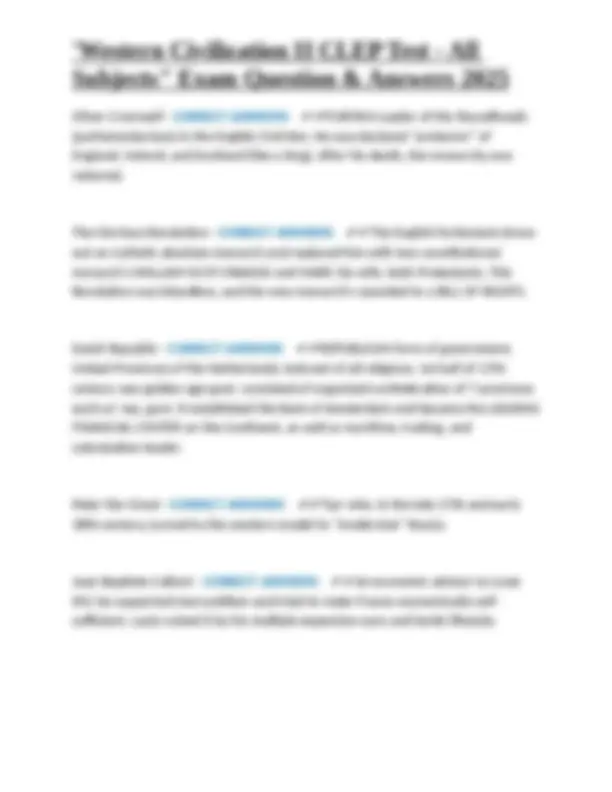
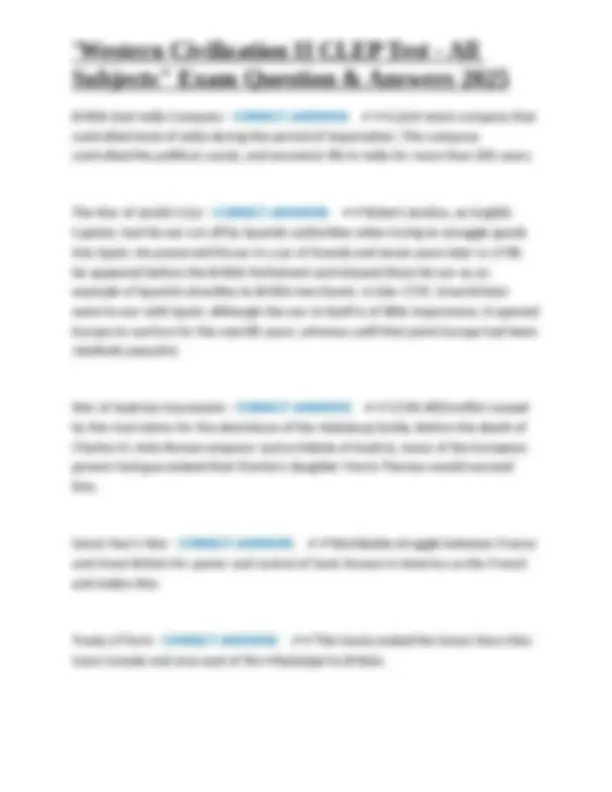
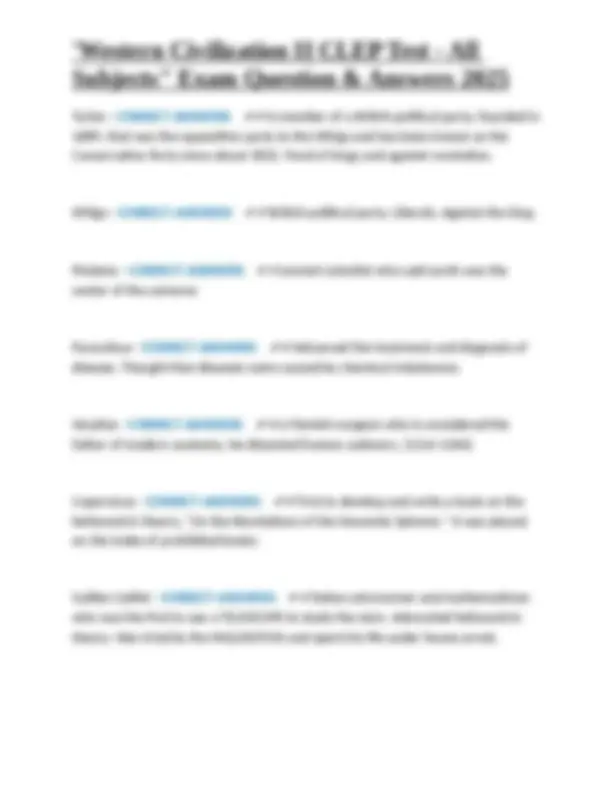
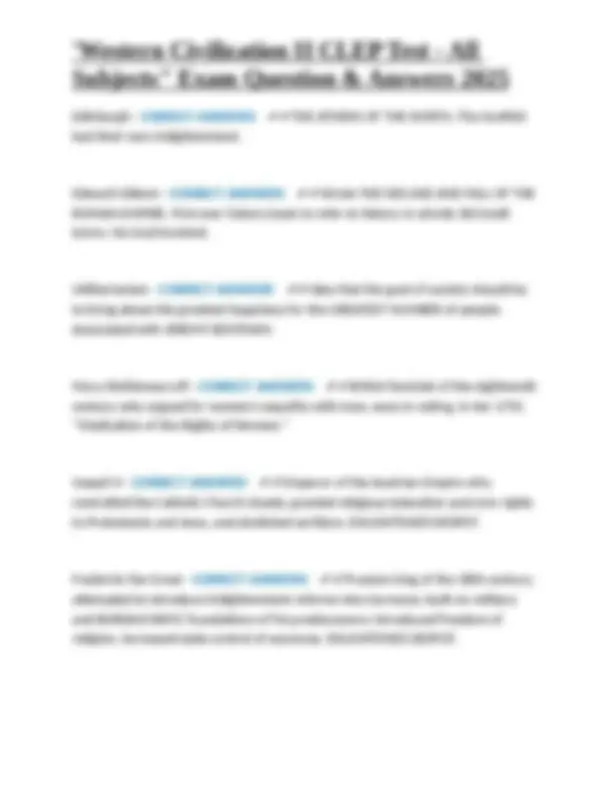
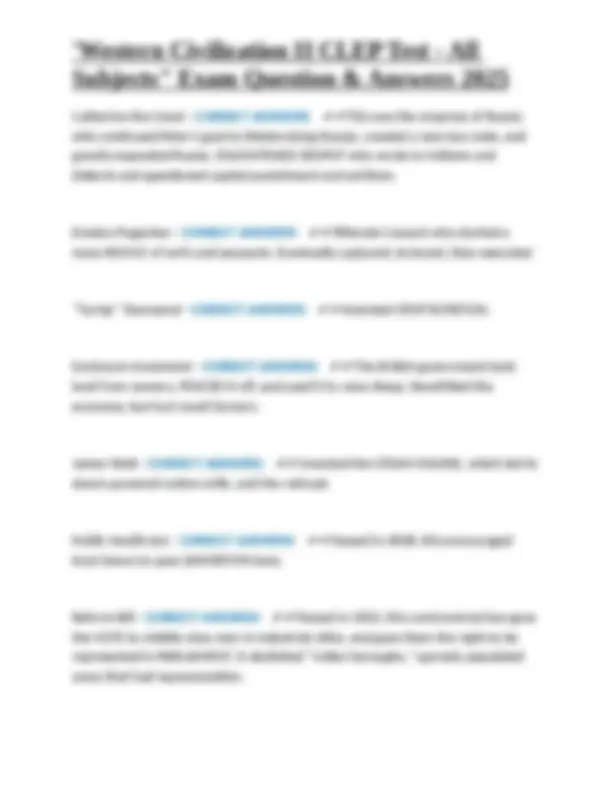
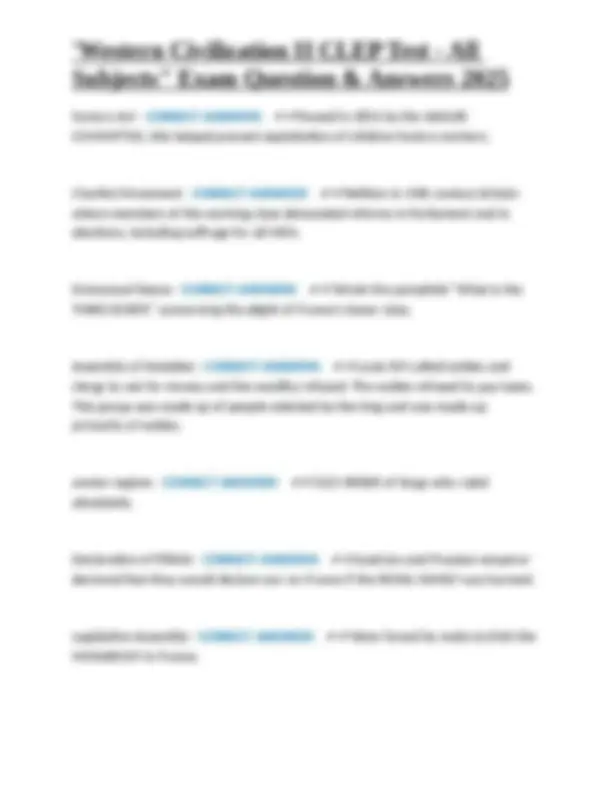
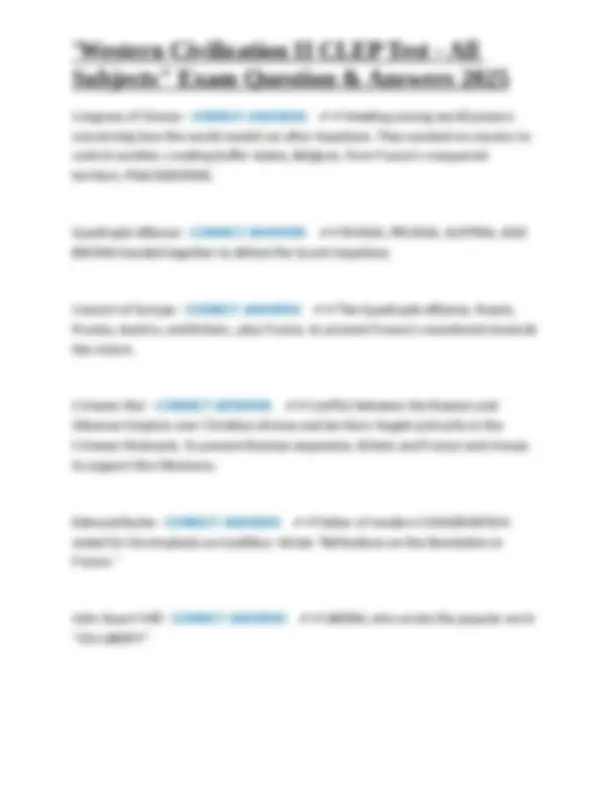
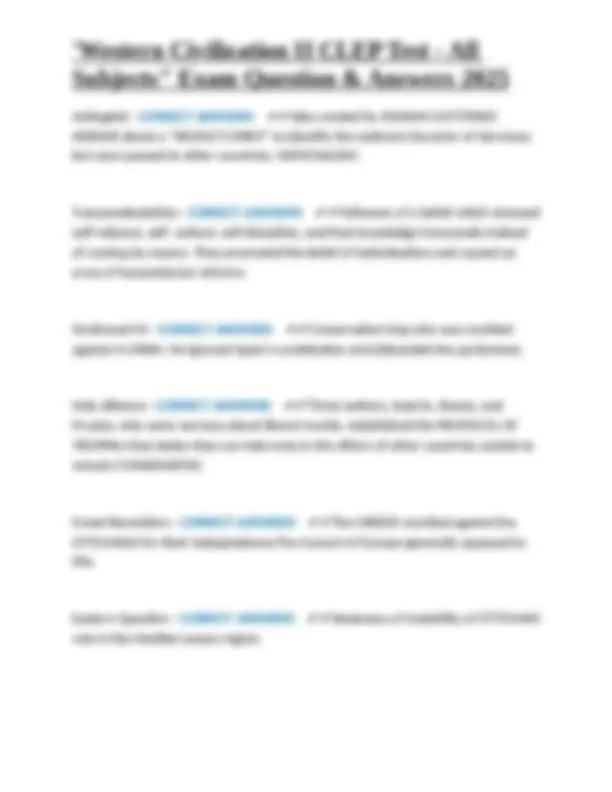
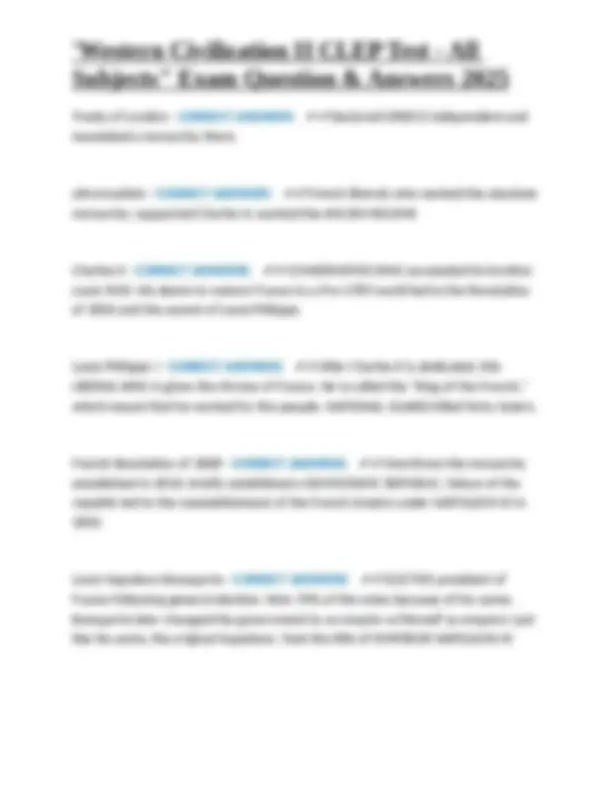
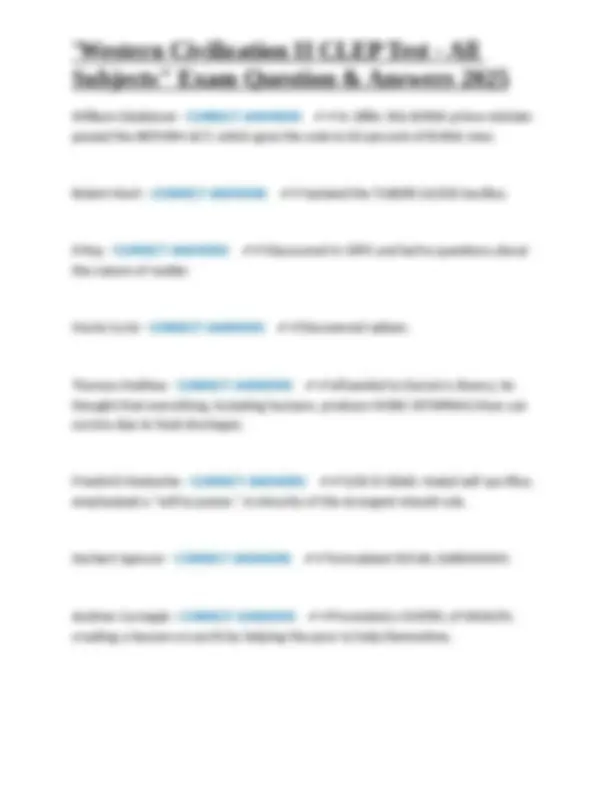
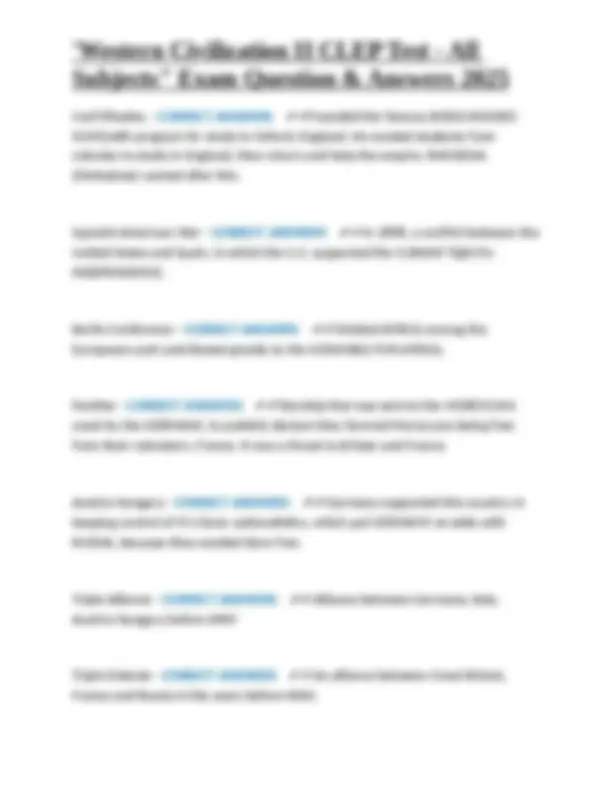
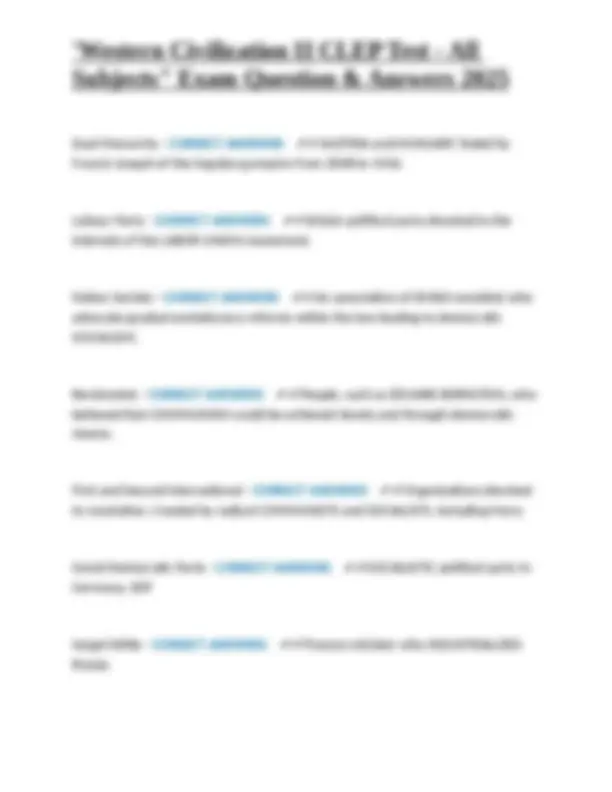
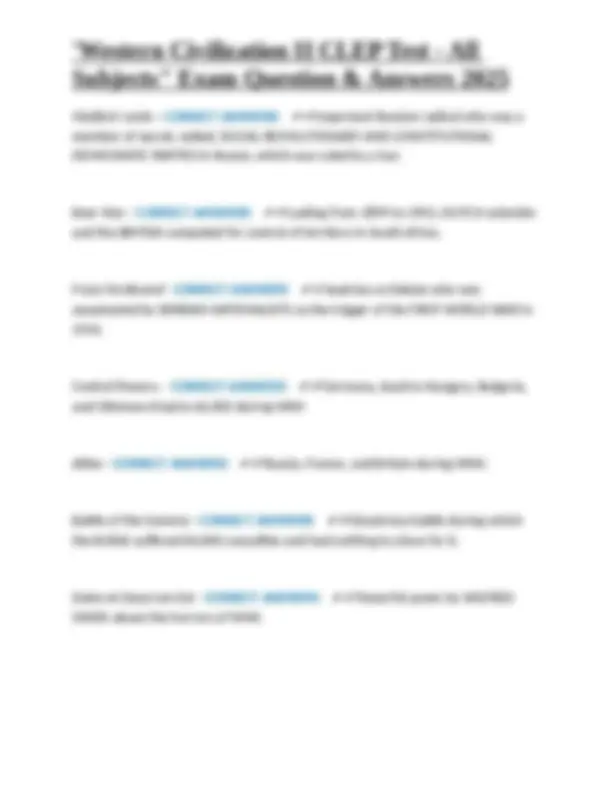
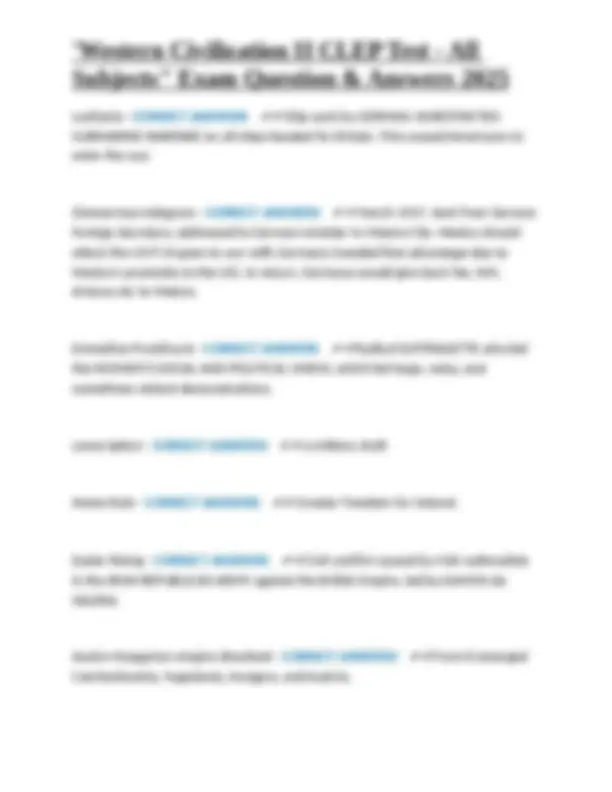
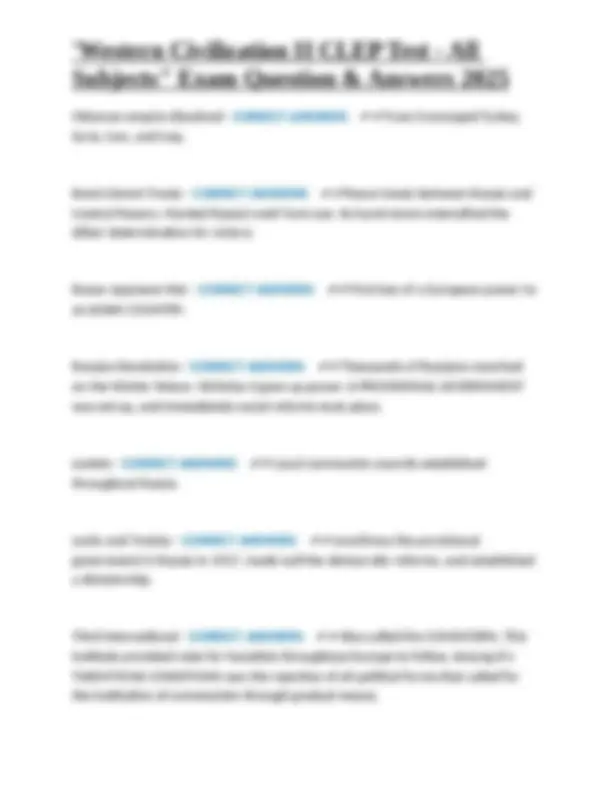
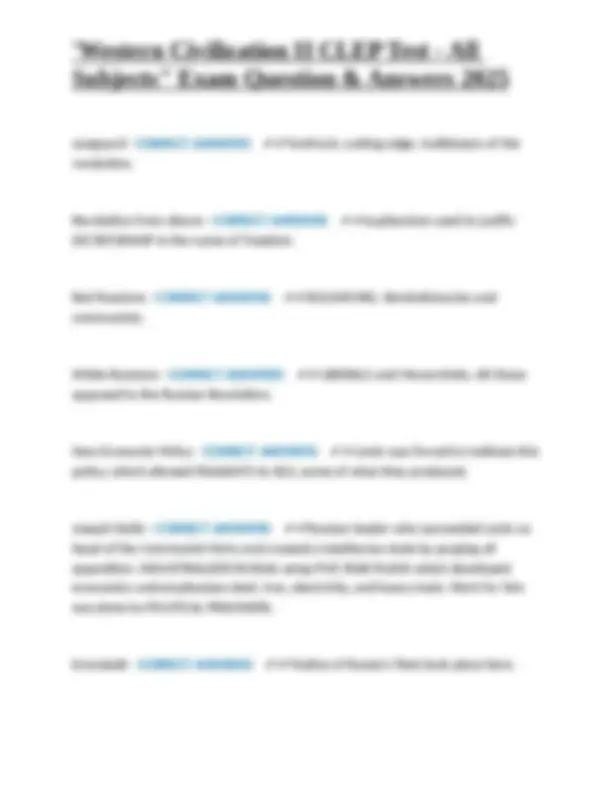
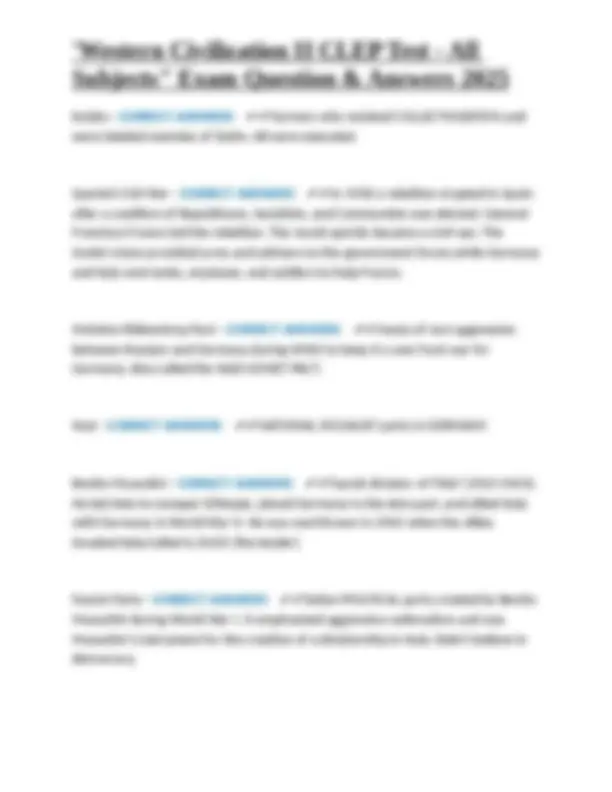
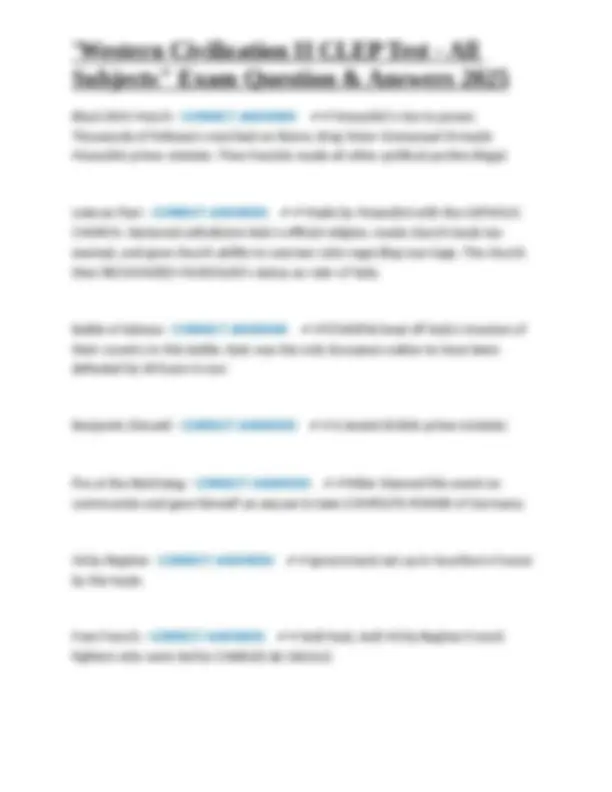
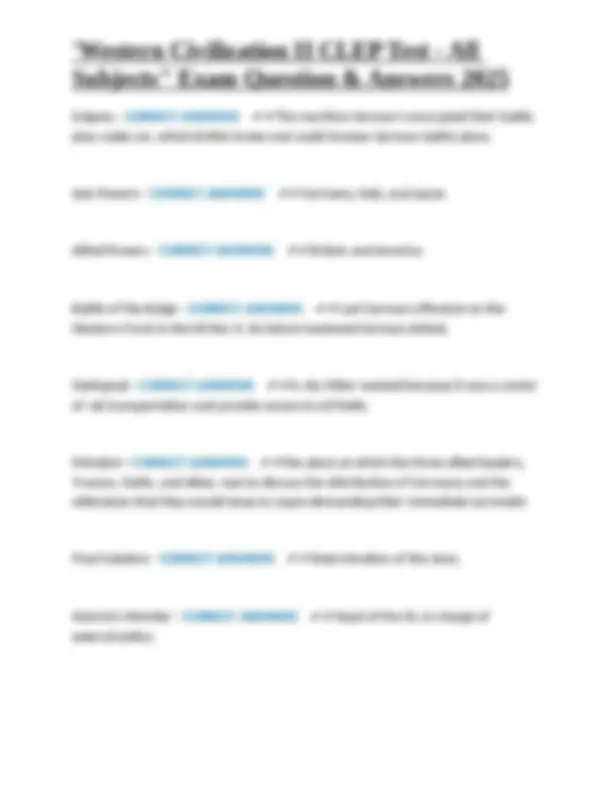
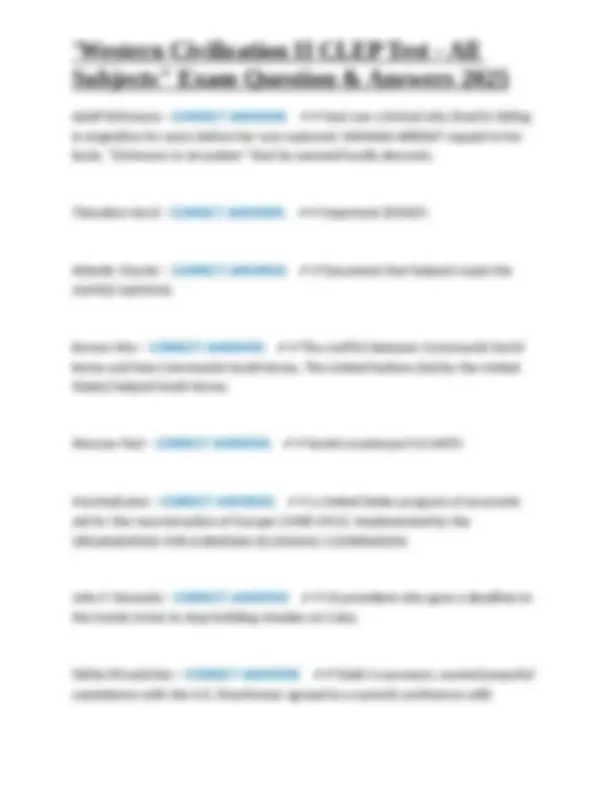
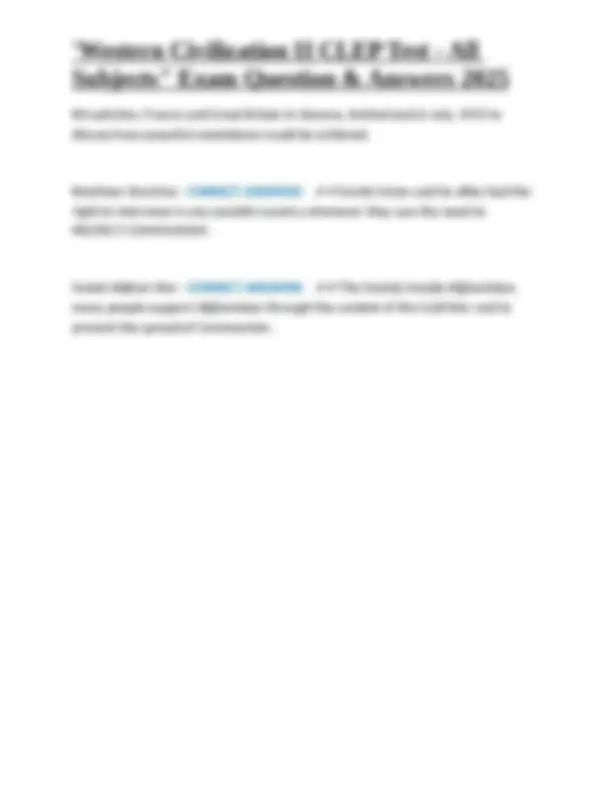


Study with the several resources on Docsity

Earn points by helping other students or get them with a premium plan


Prepare for your exams
Study with the several resources on Docsity

Earn points to download
Earn points by helping other students or get them with a premium plan
Community
Ask the community for help and clear up your study doubts
Discover the best universities in your country according to Docsity users
Free resources
Download our free guides on studying techniques, anxiety management strategies, and thesis advice from Docsity tutors
'Western Civilization II CLEP Test - All Subjects" Exam Question & Answers 2025
Typology: Exams
1 / 29

This page cannot be seen from the preview
Don't miss anything!






















Thirty Year's War - CORRECT ANSWERS ✔✔a religious war between the Catholics and Protestants, which resulted in the political restructuring of Europe and the development of nation states - the Dutch Republic, the Swiss Confederacy, the Austro-Hungarian Empire; granted religious freedom in many parts of Europe and encouraged the secularization of government. Ended with the TREATY OF WESTPHALIA. Bradenburg-Prussia - CORRECT ANSWERS ✔✔First ruled by the Great Elector, Frederick William. Formed after Thirty Year's War. Prussia's nobles, JUNKERS, were given exemption from taxes to give loyalty to the Fredericks. Built an enormous army. Would become Germany. Austro-Hungarian Empire - CORRECT ANSWERS ✔✔Large Empire ruled by Habsburgs. Created after Thirty Year's War. Unstable due to ethnic, linguistic, cultural and political differences in it's people. Sided with Germany during WWI. It split up following the end of the war. Absolutism - CORRECT ANSWERS ✔✔a form of government in which the ruler is an absolute dictator (not restricted by a constitution or laws or opposition etc.) Secularization - CORRECT ANSWERS ✔✔the process by which religious beliefs, practices, and institutions lose their significance in sectors of society and culture. Bishop Bossuet - CORRECT ANSWERS ✔✔Tutor of Louis XIV who taught about the DIVINE RIGHT of the monarchy, which helped secure Louis' ideal of absolute monarchy. Conservative. Wrote "Politics Drawn from the Very Words of Scripture."
John Locke - CORRECT ANSWERS ✔✔English philosopher who advocated the idea of a "social contract" in which government powers are derived from the consent of the governed and in which the government serves the people; also said people have natural rights to LIFE, LIBERTY AND PROPERTY. Louis XIV - CORRECT ANSWERS ✔✔The French King who built the palace at Versailles, The longest standing King of France "SUN KING",, One of the most powerful monarchs of Europe, ruling 72 years. He was famous for his quote,"I AM THE STATE." Executed by furious revolutionaries. Edict of Nantes - CORRECT ANSWERS ✔✔1598 - Granted the Huguenots liberty of worship. Revoked by Louis XIV in 1658. He chased the HUGUENOTS out of the country. Petition of Rights - CORRECT ANSWERS ✔✔Limited the power of Charles I of England. a) could not declare martial law; b) could not collect taxes; c) could not imprison people without cause; d) soldiers could not be housed without consent. First Parliamentary limit on the power of a king. English Civil War - CORRECT ANSWERS ✔✔Civil war in England between the Parliamentarians and the Royalists under Charles I. Forces of Parliament called "ROUNDHEADS". Forces of the King called "CAVALIERS". Roundheads won, Puritans (Cromwell's religion) purged Presbyterians from Parliament. New RUMP PARLIAMENT destroyed monarchy and executed Charles I
British East India Company - CORRECT ANSWERS ✔✔A joint stock company that controlled most of India during the period of imperialism. This company controlled the political, social, and economic life in India for more than 200 years. The War of Jenkin's Ear - CORRECT ANSWERS ✔✔Robert Jenkins, an English Captain, had his ear cut off by Spanish authorities when trying to smuggle goods into Spain. He preserved his ear in a jar of brandy and seven years later in 1738, he appeared before the British Parliament and showed them his ear as an example of Spanish atrocities to British merchants. In late 1739, Great Britain went to war with Spain. Although the war in itself is of little importance, it opened Europe to warfare for the next 80 years, whereas until that point Europe had been relatively peaceful. War of Austrian Succession - CORRECT ANSWERS ✔✔(1740-48)Conflict caused by the rival claims for the dominions of the Habsburg family. Before the death of Charles VI, Holy Roman emperor and archduke of Austria, many of the European powers had guaranteed that Charles's daughter Maria Theresa would succeed him. Seven Year's War - CORRECT ANSWERS ✔✔Worldwide struggle between France and Great Britain for power and control of land. Known in America as the French and Indian War. Treaty of Paris - CORRECT ANSWERS ✔✔This treaty ended the Seven Years War. Gave Canada and area east of the Mississippi to Britain.
Tories - CORRECT ANSWERS ✔✔A member of a British political party, founded in 1689, that was the opposition party to the Whigs and has been known as the Conservative Party since about 1832. Fond of kings and against revolution. Whigs - CORRECT ANSWERS ✔✔British political party. Liberals. Against the king. Ptolemy - CORRECT ANSWERS ✔✔ancient scientist who said earth was the center of the universe Paracelsus - CORRECT ANSWERS ✔✔Advanced the treatment and diagnosis of disease. Thought that diseases were caused by chemical imbalances. Vesalius - CORRECT ANSWERS ✔✔a Flemish surgeon who is considered the father of modern anatomy. He dissected human cadavers. (1514-1564) Copernicus - CORRECT ANSWERS ✔✔First to develop and write a book on the heliocentric theory, "On the Revolutions of the Heavenly Spheres." It was placed on the index of prohibited books Galileo Galilei - CORRECT ANSWERS ✔✔Italian astronomer and mathematician who was the first to use a TELESCOPE to study the stars. Advocated heliocentric theory. Was tried by the INQUISITION and spent his life under house arrest.
Charles Montesquieu - CORRECT ANSWERS ✔✔Wrote "THE SPIRIT OF THE LAWS", advocated separation of powers with the three BRANCHES of legislative, judicial, and executive, plus checks and balances. Francois Voltaire - CORRECT ANSWERS ✔✔French philosopher. Scorned all authority, religion, and corrupt government. Extreme CYNIC. Believed in tolerance, reason, and freedom of thought, expression, and religious belief, but not Christianity. Famous quote, "CRUSH THE INFAMOUS THING!,"the infamous thing being unquestioning religionsand superstitions. Denis Diderot - CORRECT ANSWERS ✔✔Edited and published the first edition of the ENCYCLOPEDIA. It was a ENLIGHTENED PERSON's BIBLE. He also attacked religion and conservatives. Jean-Jacques Rousseau - CORRECT ANSWERS ✔✔A highly influential French philosopher who believed that Human beings are naturally good & free & can rely on their instincts. Government should exist to protect common good, and be a democracy. Wrote "SOCIAL CONTRACT," and advocated the general will of the people. Adam Smith - CORRECT ANSWERS ✔✔Scottish economist who advocated private enterprise and free trade (1723-1790). His LAISSEZ-FAIRE economics maintains that governments should let the economy run on it's own and natural laws will keep it afloat. This is capitalism.
Edinburgh - CORRECT ANSWERS ✔✔THE ATHENS OF THE NORTH. The Scottish had their own Enlightenment. Edward Gibbon - CORRECT ANSWERS ✔✔Wrote THE DECLINE AND FALL OF THE ROMAN EMPIRE. First ever history book to refer to history in strictly SECULAR terms. No God involved. Utilitarianism - CORRECT ANSWERS ✔✔Idea that the goal of society should be to bring about the greatest happiness for the GREATEST NUMBER of people. Associated with JEREMY BENTHAM. Mary Wollstonecraft - CORRECT ANSWERS ✔✔British feminist of the eighteenth century who argued for women's equality with men, even in voting, in her 1792 "Vindication of the Rights of Women." Joseph II - CORRECT ANSWERS ✔✔Emperor of the Austrian Empire who controlled the Catholic Church closely, granted religious toleration and civic rights to Protestants and Jews, and abolished serfdom. ENLIGHTENED DESPOT. Frederick the Great - CORRECT ANSWERS ✔✔Prussian king of the 18th century; attempted to introduce Enlightenment reforms into Germany; built on military and BUREAUCRATIC foundations of his predecessors; introduced freedom of religion; increased state control of economy. ENLIGHTENED DESPOT.
Factory Act - CORRECT ANSWERS ✔✔Passed in 1833 by the SADLER COMMITTEE, this helped prevent exploitation of children factory workers. Chartist Movement - CORRECT ANSWERS ✔✔Petition in 19th century Britain where members of the working class demanded reforms in Parliament and in elections, including suffrage for all MEN. Emmanuel Sieyes - CORRECT ANSWERS ✔✔Wrote the pamphlet "What is the THIRD ESTATE" concerning the plight of France's lower class. Assembly of Notables - CORRECT ANSWERS ✔✔Louis XVI called nobles and clergy to ask for money and the wealthy refused. The nobles refused to pay taxes. This group was made up of people selected by the king and was made up primarily of nobles. ancien regime - CORRECT ANSWERS ✔✔OLD ORDER of kings who ruled absolutely. Declaration of Pillnitz - CORRECT ANSWERS ✔✔Austrian and Prussian emperor declared that they would declare war on France if the ROYAL FAMILY was harmed. Legislative Assembly - CORRECT ANSWERS ✔✔Were forced by mobs to END the MONARCHY in France.
Georges Jacques Danton - CORRECT ANSWERS ✔✔JACOBIN French revolutionary leader who stormed the Paris bastille and who supported the execution of Louis XVI but was guillotined by Robespierre for his opposition to the Reign of Terror (1759-1794). Jean Paul Marat - CORRECT ANSWERS ✔✔One of the prominent JACOBIN radical leaders during the revolution. He edited a radical newspaper. He called to rid France of the enemies of the Revolution Paris Commune - CORRECT ANSWERS ✔✔Led by Danton, a temporary government set up by SANS-CULOTTES that began executing anti-revolutionaries. Jacobins - CORRECT ANSWERS ✔✔Very RADICAL French revolutionary party responsible for Reign of Terror and execution of king Girondins - CORRECT ANSWERS ✔✔The CONSERVATIVE side of the National Assembly. They favored having a king and wanted an absolute monarchy like England. They were the first people to control the National Assembly. Committee of Public Safety - CORRECT ANSWERS ✔✔The leaders under Robespierre who organized the defenses of France, conducted foreign policy, and centralized authority during the period 1792-1795. REIGN OF TERROR. Thermidor - CORRECT ANSWERS ✔✔New "SECULAR" name for a month in summer.
Congress of Vienna - CORRECT ANSWERS ✔✔Meeting among world powers concerning how the world would run after Napoleon. They wanted no country to control another, creating buffer states, Belgium, from France's conquered territory. PEACEKEEPERS. Quadruple Alliance - CORRECT ANSWERS ✔✔RUSSIA, PRUSSIA, AUSTRIA, AND BRITAIN banded together to defeat the tyrant Napoleon. Concert of Europe - CORRECT ANSWERS ✔✔The Quadruple Alliance, Russia, Prussia, Austria, and Britain...plus France, to prevent France's resentment towards the victors. Crimean War - CORRECT ANSWERS ✔✔Conflict between the Russian and Ottoman Empires over Christian shrines and territory fought primarily in the Crimean Peninsula. To prevent Russian expansion, Britain and France sent troops to support the Ottomans. Edmund Burke - CORRECT ANSWERS ✔✔Father of modern CONSERVATISM. noted for his emphasis on tradition. Wrote "Reflections on the Revolution in France." John Stuart Mill - CORRECT ANSWERS ✔✔LIBERAL who wrote the popular work "ON LIBERTY"
Volksgeist - CORRECT ANSWERS ✔✔Idea created by JOHANN GOTTFRIED HERGER about a "PEOPLE'S SPIRIT" to identify the national character of Germany, but soon passed to other countries. NATIONALISM. Transcendentalists - CORRECT ANSWERS ✔✔Followers of a belief which stressed self-reliance, self- culture, self-discipline, and that knowledge transcends instead of coming by reason. They promoted the belief of individualism and caused an array of humanitarian reforms. Ferdinand VII - CORRECT ANSWERS ✔✔Conservative king who was revolted against in SPAIN. He ignored Spain's constitution and disbanded the parliament. Holy Alliance - CORRECT ANSWERS ✔✔Three nations, Austria, Russia, and Prussia, who were nervous about liberal revolts, established the PROTOCOL OF TROPPAU that states they can intervene in the affairs of other countries unable to remain CONSERVATIVE. Greek Revolution - CORRECT ANSWERS ✔✔The GREEKS revolted against the OTTOMANS for their independence.The Concert of Europe generally opposed to this. Eastern Question - CORRECT ANSWERS ✔✔Weakness of instability of OTTOMAN rule in the Mediterranean region.
Franco-Prussian War - CORRECT ANSWERS ✔✔A war between France and Prussia that ended the Second Empire in France and led to the founding of modern Germany; 1870-1871Declared by OTTO VON BISMARK. Humiliating for the French. Treaty of Frankfurt - CORRECT ANSWERS ✔✔The end of the FRANCO-PRUSSIAN War. Alsace and Lorraine given to Germany. Giuseppe Mazzini - CORRECT ANSWERS ✔✔Italian nationalist whose writings spurred the movement for a unified and independent Italy (1805-1872) YOUNG ITALY, and RISORGIMENTO movements. Charles Albert - CORRECT ANSWERS ✔✔King of PIEDMONT-SARDINIA, part of Italy. Count Cavour - CORRECT ANSWERS ✔✔Prime minister of Sardinia (northern Italy) who vowed to drive out the Austrians and worked towards a united Italy. Austro-Piedmontese War - CORRECT ANSWERS ✔✔Piedmont, Italy defeated Austro-Hungarian empire and won their INDEPENDENCE. Giueseppe Garibaldi - CORRECT ANSWERS ✔✔(1807-1882) Soldier of fortune who amassed his "RED SHIRT" army to bring Naples and Sicily into a unified Italy.
Kaiser Wilhelm I - CORRECT ANSWERS ✔✔The King of Prussia who chose Otto Van Bismark to be his Prime Minister. He was eventually crowned Kaiser of Prussia and Germany. Seven Weeks' War - CORRECT ANSWERS ✔✔aka AUSTRO-PRUSSIAN War (1866) This war resulted from Bismarck wanting to isolate Austria from German affairs North German Confederation - CORRECT ANSWERS ✔✔Result of end of Austria- Prussian War, Austria doesn't get involved in German affairs, North German Confederation made under rulership of Prussia. Major step towards German unification. Daimler and Benz - CORRECT ANSWERS ✔✔Perfected the INTERNAL COMBUSTION ENGINE, for cars. William and Catherine Booth - CORRECT ANSWERS ✔✔Founded the Salvation Army John Rockefeller - CORRECT ANSWERS ✔✔Monopolized more than 75% of U.S. oil. Steel - CORRECT ANSWERS ✔✔The most important commodity of the SECOND Industrial Revolution. Used for building ships, trains, bridges, and weapons of war.
Cecil Rhodes. - CORRECT ANSWERS ✔✔Founded the famous British RHODES SCHOLARS program for study in Oxford, England. He wanted students from colonies to study in England, then return and help the empire. RHODESIA (Zimbabwe) named after him. Spanish-American War - CORRECT ANSWERS ✔✔In 1898, a conflict between the United States and Spain, in which the U.S. supported the CUBANS' fight for INDEPENDENCE. Berlin Conference - CORRECT ANSWERS ✔✔Divided AFRICA among the Europeans and contributed greatly to the SCRAMBLE FOR AFRICA. Panther - CORRECT ANSWERS ✔✔Warship that was sent to the MOROCCAN coast by the GERMANS, to publicly declare they favored Moroccans being free from their colonizers, France. It was a threat to Britain and France. Austria-Hungary - CORRECT ANSWERS ✔✔Germany supported this country in keeping control of it's Slavic nationalistics, which put GERMANY at odds with RUSSIA, because they wanted Slavs free. Triple Alliance - CORRECT ANSWERS ✔✔Alliance between Germany, Italy, Austria-Hungary before WWI Triple Entente - CORRECT ANSWERS ✔✔An alliance between Great Britain, France and Russia in the years before WWI.
Dual Monarchy - CORRECT ANSWERS ✔✔AUSTRIA and HUNGARY. Ruled by Francis Joseph of the Hapsburg empire from 1848 to 1916. Labour Party - CORRECT ANSWERS ✔✔Britain political party devoted to the interests of the LABOR UNION movement. Fabian Society - CORRECT ANSWERS ✔✔An association of British socialists who advocate gradual evolutionary reforms within the law leading to democratic SOCIALISM. Revisionists - CORRECT ANSWERS ✔✔People, such as EDUARD BERNSTEIN, who believed that COMMUNISM could be achieved slowly and through democratic means. First and Second International - CORRECT ANSWERS ✔✔Organizations devoted to revolution. Created by radical COMMUNISTS and SOCIALISTS, including Marx. Social Democratic Party - CORRECT ANSWERS ✔✔SOCIALISTIC political party in Germany. SDP Sergei Witte - CORRECT ANSWERS ✔✔Finance minister who INDUSTRIALIZED Russia.